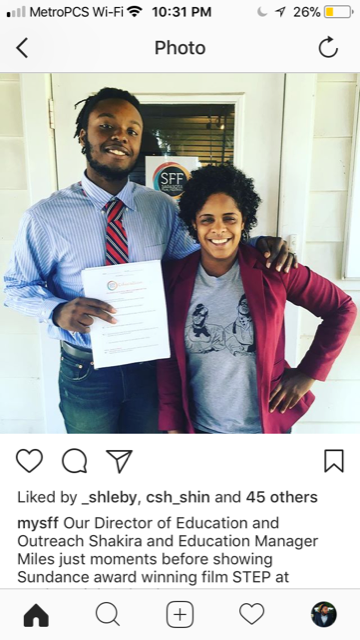In many ways, Cornell felt deserving of being our capstone school of sorts. For one, being an Ivy-League school helped its resume a lot; granted, I know the ivory tower prestige of the Ivy League is for the most part imaginary (or a social construct for my liberal arts heads out there), but stepping foot on one for the first time felt worthy of the several "Look Ma, I made it" selfies I shamelessly took. That aside, though, we would be meeting up with Million Hoodies member Delmar Fears, Vice President of Black Students United - Cornell's Black Student Union - and current junior.
Delmar was somewhat of a departure from the film's motif of student government organizations: though not formally a representative of Cornell's student government, her involvement in student activism on campus felt undeniably relevant to the conversation. I first got in contact with Delmar the previous school year during a Million Hoodies chapter convening in New York. It was a seemingly insignificant interaction to begin with: someone borrowed her phone to send me a "wya?" over Messenger, and thus there was a stranger in my chat list. Fast forward to a few months after this, however, and the trivial became the clandestine.
On September 15th, an anonymous black Cornell student was assaulted after a group of white male students initiated a physical confrontation. A video was captured and uploaded to YouTube of the argument's aftermath, where members of the small gang of students can be heard shouting slurs at an advocate for the victim who approached an hour after the assault took place. The earlier dispute had come to blows after, as a witness recalled, the victim intervened in the group's haranguing of another student outside of his place of residence. As a result, Ithaca police arrested one unidentified student under the misdemeanor charge of third-degree assault. Naturally, though, this wasn't the first nor the last time such an incident would occur, and thus the Cornell BSU sprang into action.
I would later see several news headlines of an occupation taking place at Cornell and represented by none other than Delmar Fears, finally putting a character to the name and face in my contacts. Thankfully she might not have immediately deleted the chat either, as she eagerly was the first of all our direct contacts to agree to accommodate Eduardo and I meeting to discuss the action months later. Hence, I found myself on the last day of our trip in the frigid cold of an upstate NY winter where ya boy experienced real, non-mall snow for the first time! Piles of it greeted us, having already fallen and greyed days before our arrival. Wasn't exactly the white Christmas I'd dreamed of, but given the context of the film I figured it might've been a little too ironic.
We met with Delmar by the afternoon as she walked us through the BSU's actions place-by-place. She elaborated the entire planning process for the protests to us, giving the camera a step-by-step walkthrough of Black Students United's occupation of Willard Straight Hall. The action, covered by several media outlets, was hallmarked by the impactful image of Delmar handing university President Martha Pollack a list of demands drafted by her student group in the same building that was once occupied by BSU's 1960's predecessor for Cornell's most notable Civil Rights demonstration. A six page, twelve item document outlining the policy concerns and propositions about diversity, admissions and other administrative processes was shown to us as a relic of the demonstration that some hoped would be fulfilled. Obviously, as we were told by Delmar eventually, not all demands were met or implemented, but a task force in response to the incident and the concerns it raised was the first apparent step from Cornell administration to appease BSU. Though Delmar would be taking part, she made sure to articulate to us that the work was far from complete.
Not one to exclude the hard work of others, Delmar also invited us to the BSU's screening of the Grammy's that night in order to interview other members involved in the action, to which we happily obliged. More than anything, we should let this paragraph stand as a shout out to Black Student's United as a whole. They gave us their recounting of events, but also a message of clarity and hope about their undergraduate years. It was evident in more than their interviews too, as the one event we managed to attend felt like one of the warmest campus welcomes we'd received all trip. Ultimately, a room full of people echoed my "bruh..." at Kendrick Lamar not winning Album of the Year, which is a level of solidarity I felt was grateful for as an ending to our travels.
As we left Ithaca the following morning, we'd return back to Sarasota where the plan was for me to wrap up these blog posts and happily call it a day. The sequence of wackness that went down instead, though, led to an extended delay in my post schedule that I decided to go in detail about in some extra entries later this week. It would have been naive of me to think, in my first filmmaking endeavor, that productions ever went according to plan.
With all the flying and filming completed, it finally felt like there was a body of text behind Sincerely, the Black Kids, and with that came a sense of completion. The story we aimed to tell became something that I feel extends beyond just black students or student government officials. Reflecting on all of the footage we took from students black, nonblack and white alike lead me to look back on my little <1000 student liberal arts college with a wider lens. Normally this would be where I drop some high-key hotep knowledge about how deep the hustle goes, but after spending a week investigating the experiences of minorities on campuses other than mine, the similarities and differences alike all spoke to a macrocosmic phenomenon I remain painfully aware of - the same phenomenon that assured me I could travel to three random schools I'd never been to and make a film out of what we go through. Ivy League, liberal arts, south, north, east, west, whichever - how different are our differences? Very, I'm sure. But how similar our similarities are? Sometimes that's not always as reassuring a thought as it seems.
Back at New College of Florida, our Black History Month Planning Committee would be beginning our month long series of events tied to our theme: Black Joy. It's been a theme I've been ruminating over since the year even started, considering I'd be preceding the month with some pretty non-joyful stories to tell. Yet, the joy I do find in this whole experience is powerful, and though I returned home tired and a bit worn, I knew the end of this film would be joyful.
So stay tuned as we catch the New College leg of our production through until the end of February. Hopefully, by then, I'll have a woke ass reflection to end on.

